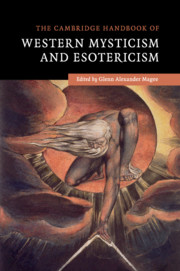Book contents
- Frontmatter
- Dedication
- Contents
- Acknowledgments
- Editor's Introduction
- List of contributors
- I ANTIQUITY
- II THE MIDDLE AGES
- III THE RENAISSANCE AND EARLY MODERNITY
- IV THE NINETEENTH CENTURY AND BEYOND
- 20 Spiritualism
- 21 H. P. Blavatsky and Theosophy
- 22 Rudolf Steiner and Anthroposophy
- 23 The Golden Dawn and the O.T.O.
- 24 G. I. Gurdjieff and the Fourth Way
- 25 C. G. Jung and Jungianism
- 26 René Guénon and Traditionalism
- 27 Via Negativa in the Twentieth Century
- 28 Contemporary Paganism
- 29 The New Age
- V COMMON THREADS
- Suggestions for Further Reading
- Index
- References
26 - René Guénon and Traditionalism
from IV - THE NINETEENTH CENTURY AND BEYOND
Published online by Cambridge University Press: 05 May 2016
- Frontmatter
- Dedication
- Contents
- Acknowledgments
- Editor's Introduction
- List of contributors
- I ANTIQUITY
- II THE MIDDLE AGES
- III THE RENAISSANCE AND EARLY MODERNITY
- IV THE NINETEENTH CENTURY AND BEYOND
- 20 Spiritualism
- 21 H. P. Blavatsky and Theosophy
- 22 Rudolf Steiner and Anthroposophy
- 23 The Golden Dawn and the O.T.O.
- 24 G. I. Gurdjieff and the Fourth Way
- 25 C. G. Jung and Jungianism
- 26 René Guénon and Traditionalism
- 27 Via Negativa in the Twentieth Century
- 28 Contemporary Paganism
- 29 The New Age
- V COMMON THREADS
- Suggestions for Further Reading
- Index
- References
Summary
Introduction
What is sometimes called “Guénonian Traditionalism” is a school or movement most easily identified by its origin in the writings of the French philosopher René Guénon (1886–1951). Guénonian Traditionalism – distinguished in this essay from other forms of traditionalism by the use of a capital “T” – was originally developed in Paris in the 1920s and has since become widespread and influential. Some Traditionalists today stay close to Guénon's original conceptions and practice, and they may be said to form the Traditionalist school, sometimes now called Integral Traditionalism; others have modified and developed his ideas to the extent that purist Guénonians do not recognize them as fellow Traditionalists. These may be said to be part of the broader Traditionalist movement.
Guénonian Traditionalists of both sorts understand “tradition” in a special sense that distinguishes them from the many other individuals and groups that use the term. For Traditionalists, “tradition” indicates the spiritual wisdom that is conceived as having formed the ancient core of all the great religions and spiritual paths – in effect, the perennial philosophy. The term “perennialist” is also used, both by some Traditionalists to describe themselves and by some outsiders. Traditionalists, however, differ from other perennialists such as Aldous Huxley (who published his The Perennial Philosophy in 1944) in their anti-modernism and their insistence on esoteric initiation. Huxley, for example, was interested in neither of these. This insistence is one basis on which Traditionalism may be classed as esoteric; another is the degree to which Traditionalism draws on other esoteric currents discussed in this volume, even though Traditionalists are fiercely critical of most other such currents, which they see as “pseudo-initiatic” or even “counter-initiatic.”
Traditionalism has a complex doctrine, and a cyclical conception of time borrowed from Hinduism. In the distant first age of the current cycle, spiritual wisdom was widespread and generally accessible; in the current and final age, identified as the kali yuga or dark age, spiritual wisdom has almost vanished. The result is what is called modernity, with all its problems. Inevitably, things will degenerate further. During the first age, spiritual wisdom was unified, and there was no distinction between the esoteric and exoteric.
- Type
- Chapter
- Information
- The Cambridge Handbook of Western Mysticism and Esotericism , pp. 308 - 321Publisher: Cambridge University PressPrint publication year: 2016



